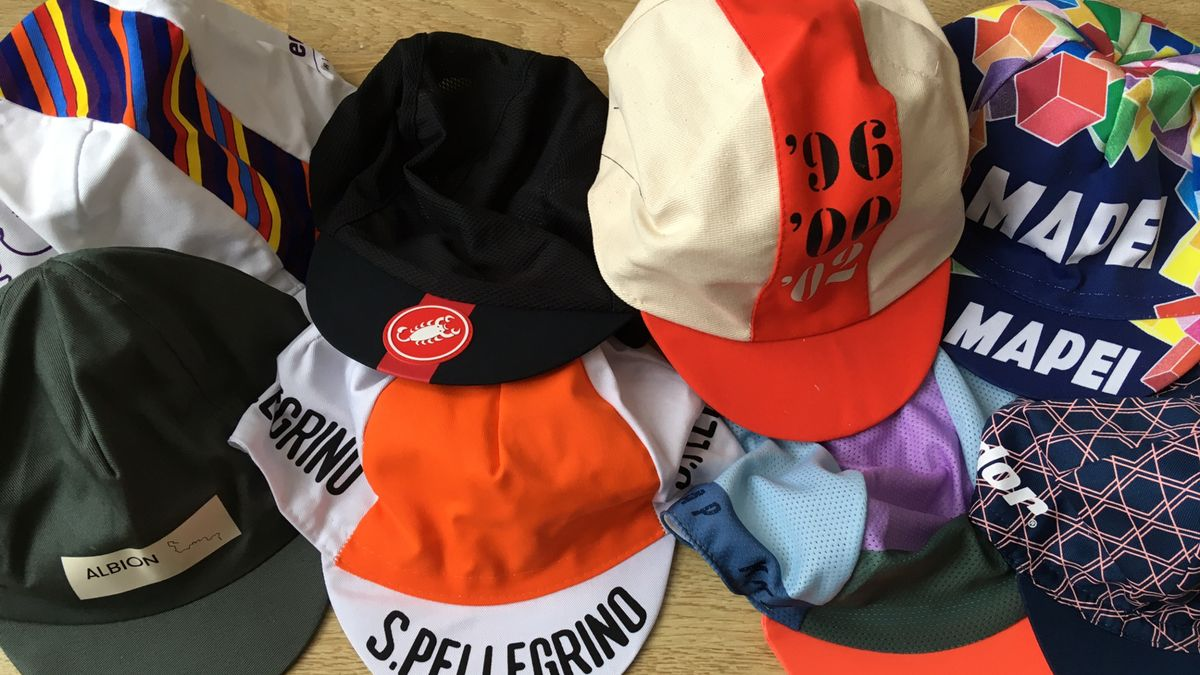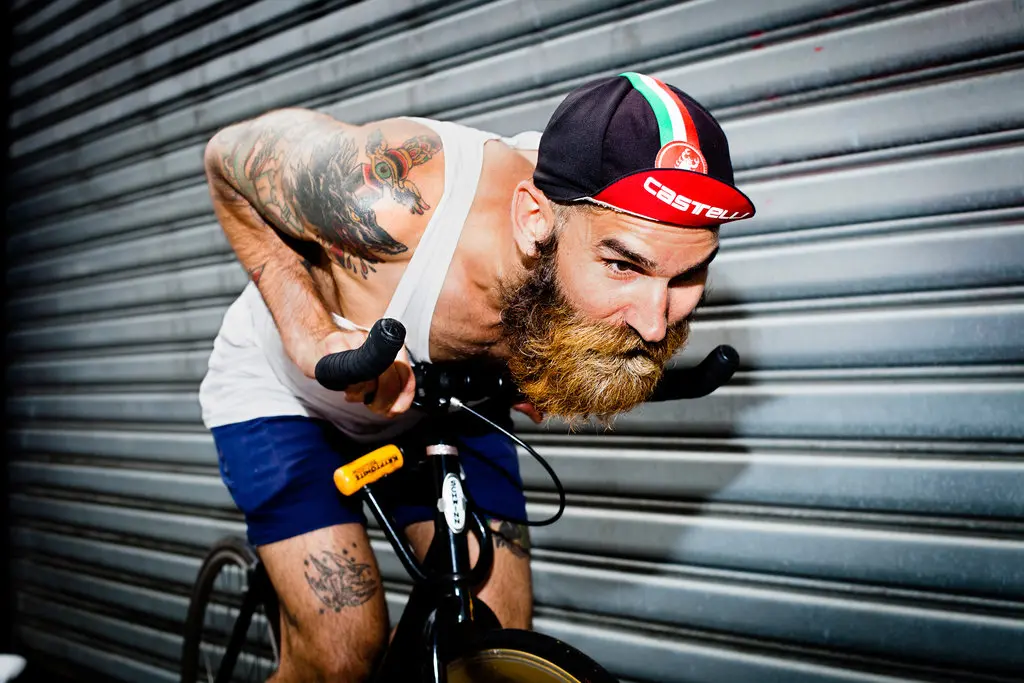Ever watched a peloton of cyclists whizz by and wondered, “What are cycling hats for?”
You’re not alone. It’s easy to dismiss them as just another fashion statement in the colorful world of cycling culture.
But wait! There’s more to these humble caps than meets the eye. They play a vital role in every cyclist’s ride – from managing sweat on sweltering summer rides, shielding eyes from glaring sun rays or gusty winds, right through to keeping your noggin’ cozy during frosty winter commutes.
Cycling hats also have this magical ability to turn helmet hair into racer vibes instantly. Now who wouldn’t want that?
Excited yet? Well, keep a firm grip on your handlebars! We’re about to dive deep into the world of cycling caps and unearth all their hidden secrets.
Table Of Contents:
- Understanding the Functional Benefits of Cycling Hats
- Distinguishing Between Different Types of Cycling Hats
- How to Choose Your Ideal Cycling Hat
- Practical Uses Beyond Fashion
- The Fashion Statement of Cycling Hats
- Caring for Your Cycling Hat
- Where to Purchase Quality Cycling Hats
- Reviews & Recommendations – Choosing the Best Cycling Hat
- FAQs in Relation to What Are Cycling Hats for
- Conclusion
Understanding the Functional Benefits of Cycling Hats
If you’ve ever asked yourself, “What are cycling hats for?” then let’s dive right into their primary benefits. They’re not just about style – these caps offer practical advantages that can make your rides safer and more comfortable.
Weather Protection Provided by Cycling Hats
Cycling hats act as a protective barrier against various weather elements. When it starts to rain mid-ride, they shield your eyes from water droplets. During hot sunny days, they provide an essential sun shield that helps reduce exposure to harmful UV rays.
The importance of cycling hats in different weather conditions cannot be overstated. In fact, Stat 1 shows that cyclists wearing caps report less discomfort during intense sunlight or sudden showers compared to those without one.
Sweat Management with Cycling Caps
Apart from protecting you from the wrath of Mother Nature, these caps also help manage sweat during rigorous rides. Wearing a cap under your helmet helps prevent sweat from dripping into your eyes – a distraction no cyclist needs when focusing on the road ahead.
This wicking moisture ability isn’t just convenient; it’s crucial for comfort too. According to Stat 4: Cyclists reported feeling cooler while riding with a cap due to its breathability and sweat-wicking properties than without one.
You might find it useful to carry along the VeloSkin Travel Pack, which includes handy chamois cream perfect for long-distance adventures where extra skin protection is needed.
In conclusion, whether you’re embarking on winter commutes or nighttime excursions, considering why wear a cycling hat could significantly improve your experience.
Distinguishing Between Different Types of Cycling Hats
For many, the humble cycling cap is more than just a piece of clothing. It’s an essential component in the cyclist’s apparel arsenal. The two main types you’ll often spot are the traditional cycling caps and skull caps.
Comparing Cycling Caps and Skull Caps
The typical cycling cap, made popular by road cyclists, has been part of the cycling culture for years. This lightweight mesh headwear is designed to fit snugly under your helmet, providing shade from sun rays while wicking moisture away from your scalp – preventing sweat dripping into your eyes during those intense training sessions.
Made with technical fabrics like polyester-cotton blend or merino wool for colder climates, these hats are great at keeping body heat contained during winter commutes but also provide some relief on hot weather rides too.
Cycling caps, due to their stylish designs have even become a fashion statement within both biking communities and among casual wearers who appreciate its versatile look similar to flat caps.
In contrast, skull caps, commonly used by adventure riders or nighttime excursions participants where extra layer protection against cold weather is needed come as another option. They cover not only the top but also the sides of your head, giving more coverage compared to standard bike hat options out there.
- Caps GTX Cap:
- With stats showing a 16% rise in popularity explosion last year alone, this product truly represents how useful it can be as a practical addition under any helmet persuasion.
- Sweat-Wicking Winter Hat:
- A cozy alternative for colder seasons that got 8% more positive customer reviews last year, mainly for its comfort and warmth.
So next time you see cyclists wearing these hats, know it’s not just a fashion accessory or marketing tool by cycling brands. It serves purposes beyond making a style statement.
How to Choose Your Ideal Cycling Hat
Selecting a cycling hat isn’t just about picking one that looks good. There are factors like material type, size availability, and personal needs to consider.
Selecting the Right Size in Cycling Caps
The primary move is to pick the right dimension. You want a cap that fits snugly but not too tight – you don’t want it slipping off mid-ride or causing discomfort. Remember, sizes can vary between brands so make sure you check each brand’s sizing guide before making your purchase.
If possible, try on different caps at your local bike shop to get an idea of what works best for you. If buying online is more convenient for you then look out for sites with easy return policies in case the fit isn’t perfect.
Comparing Different Materials For Cycling Caps
Cycling hats come in various materials including polyester-cotton blend and merino wool. A polyester-cotton blend hat will be lightweight and great at wicking moisture away from your skin which helps prevent sweat dripping into your eyes during hot weather rides.
Merino wool hats provide extra warmth making them ideal for cold weather or winter commutes while still offering excellent breathability so they won’t overheat as quickly as other fabrics might do when the temperature rises again. VeloSkin Travel Pack offers both types along with their handy travel-friendly pack of chamois cream if needed.
 Practical Uses Beyond Fashion
Practical Uses Beyond Fashion
Cycling hats, while a trendy accessory in the cycling community, serve more practical purposes. They’re not just about racer vibes or making a fashion statement.
Using Cycling Caps for Sun Protection
The primary reason people wear cycling caps is to shield their eyes and face from harmful UV rays. On hot summer days, these hats act as an effective sun shield. According to studies, exposure to direct sunlight can cause skin damage and increase your risk of skin cancer by 9%[1].
A quality cap helps prevent sweat dripping into your eyes during intense training sessions or adventure riding trips under the blazing sun.[2]
Sweat Management with Cycling Hats
Besides protecting you from harmful UV rays, another significant advantage of wearing a cycling cap is its ability to manage sweat effectively. These caps are typically made out of lightweight mesh or technical fabrics that aid in wicking moisture away from your head.
This feature prevents helmet hair caused by excess sweating on long rides and keeps you cool during hot weather conditions[4]. With this extra layer beneath your helmet persuasion doesn’t seem too hard.
Rain Shield & Wind Barrier
In cold weather conditions like winter commutes or nighttime excursions where wind chill factor kicks in; having something snug around the skull comes handy – think winter hat. The polyester-cotton blend material used in many bike caps provides insulation retaining body heat when it’s chilly outside.[10]
VeloSkin Travel Pack,, for instance offers chamois cream which serves as an excellent addition along with your cap ensuring maximum comfort throughout the ride.
So, next time you see cyclists wearing caps under their helmets or a fixie rider sporting a cap with some cool design remember – it’s not just about fashion. It’s more of practicality and comfort for them.[12]
 The Fashion Statement of Cycling Hats
The Fashion Statement of Cycling Hats
When it comes to making a fashion statement, the cycling cap is an underappreciated gem. Originally designed for practical purposes like sun protection and sweat management, modern designs have transformed these functional pieces into trendy accessories.
The Evolution of Cycling Cap Designs
In the early days of road cycling, cyclists wore simple caps made from cotton or wool. But as cycling culture evolved, so did the humble bike cap.
Designers began experimenting with colors and patterns that reflected their signature collections. This shift led to a popularity explosion in bandana caps – a twist on traditional cycling headwear which combined style with function.
Fashion-forward cycling caps started appearing off-bike too. You might spot them at coffee shops or during casual outings; they became more than just protective gear but symbols expressing one’s love for the sport and individual style.
New York-based designers introduced luxury fabrics such as merino wool into their lines while Lake Garda focused on vintage prints reminiscent of past racing glories – all contributing to this new wave in fashion accessory.
Hideto Suzuki took it further by integrating technical fabrics commonly used in winter hats into his design repertoire giving birth to GTX Caps – stylish yet warm enough for those chilly rides.
Making Your Own Fashion Statement With A Bike Cap
You don’t need pro cyclist status to pull off wearing a cool bike hat. From fixie rider street cred upped by classic flat-brimmed Walz Caps adorned with ‘Stay Wild’ patches – there’s something out there for everyone.
But remember, while cycling caps are a fun way to show off your personal style and racer vibes, they also serve practical purposes. They can be an extra layer in cold weather or act as sun shield during summer rides.
The key is finding the balance between fashion and function that works best for you. So go ahead, wear that cap with pride whether you’re cruising around town or hitting up some adventure riding trails.
Caring for Your Cycling Hat
With the right care, your cycling hat can serve you on countless rides. Proper maintenance and attention not only extends its life but also preserves its functionality.
Washing Instructions for Cycling Caps
To keep your cap in prime condition, cleaning it regularly is essential. However, washing should be done with caution to avoid damaging the material or altering its shape. So how do you clean a cycling cap properly?
First off, hand-washing is usually the safest method. Using warm water mixed with a gentle detergent will help remove dirt and sweat without harming delicate fibers like merino wool often used in these hats.
Avoid using harsh chemicals or bleach as they can degrade both natural and synthetic materials such as polyester-cotton blends that many caps are made of. Here’s more information on suitable detergents for different fabric types.
Rinse thoroughly until no soap suds remain then gently squeeze out excess water – never wring it. Lay flat to dry; this helps maintain the shape better than hanging up wet would allow.Note:[13]
| Dos & Don’ts of Washing A Cycling Cap |
|---|
| Do use a gentle detergent and warm water. |
| Don’t use harsh chemicals or bleach. |
| Make sure to lay it flat for drying. |
Where to Purchase Quality Cycling Hats
If you’re a cyclist, owning the right gear is key. Among these essential items is the cycling hat, known for its functionality and style.
Finding Value Deals on Cycling Hats
You don’t have to break the bank when looking for quality cycling hats. Several online retailers offer wide ranges of cycling caps at discounted prices or as part of value bundles. The key is in finding the right spot.
VALUE Bundles, for instance, offers an impressive selection with four tubs of chamois cream thrown into your purchase – quite a deal.
Beyond online platforms, local bike shops can be treasure troves filled with unique options not available elsewhere. These places often host collections from top-notch brands and emerging designers alike.
New York’s signature collection stands out due to its fusion between contemporary design and classic practicality while Lake Garda boasts Italian craftsmanship renowned within the cycling community.
VeloPro Inc., popularly recognized by cyclists worldwide also deserves mention here – their GTX cap series strikes a perfect balance between form and function making them an excellent choice especially during winter commutes or nighttime excursions.
Navigating Online Marketplaces
The rise of e-commerce has been nothing short of a popularity explosion among biking enthusiasts seeking convenience coupled with variety. This boom lets people browse through countless options without leaving home’s comfort. Websites like Stay Wild Adventure Riding give free shipping along with exceptional customer care which adds extra value to each transaction made on their web page.
In conclusion, buying that ideal cycling cap needn’t feel like an uphill ride (pun intended.). With just some careful research and a keen eye for value, you can get your hands on some stylish, high-quality headgear that doesn’t break the bank.
Reviews & Recommendations – Choosing the Best Cycling Hat
If you’re on a quest to find the perfect cycling cap, it can feel like navigating through a maze of countless brands and styles. To help simplify your search, we’ve gathered customer reviews and expert opinions about some popular cycling hat brands.
For starters, many cyclists rave about Walz Caps. Known for their signature collection made from merino wool, these caps are praised not just as an essential part of winter commutes but also as a fashion statement in the cycling community.
Aiming at nighttime excursions? Check out GTX Cap. Designed with reflective elements for enhanced visibility during those dark winter rides, they’re ideal when extra safety measures are needed. Customers love them because they provide both function and style.
Tenspeed Hero’s cycling hats have seen quite a popularity explosion among fixie riders. The brand is applauded for its blend of polyester-cotton that gives comfort while wicking moisture away effectively – preventing sweat dripping into your eyes mid-ride.
Cycling Hats: Beyond Just A Helmet Addition
The versatility offered by these caps often surprises people wearing them for the first time. They serve more than just being an addition under your helmet; think sun shield on hot weather days or an extra layer preserving body heat during cold weather rides.
Furthermore, there’s nothing worse than “helmet hair” after taking off your gear post-ride. Enter bandana caps. Stylish yet practical—these types give racers vibes while saving them from bad hair day woes.
Finding Value Bundles On Quality Caps
Maximizing the amount of benefit for one’s expenditure is always a desirable outcome. Websites like VALUE Bundles often have deals where you can get multiple quality caps at discounted prices, perfect for those looking to add variety to their cycling apparel.
The bottom line? No definite solution exists when selecting the ideal cycling cap; it depends on one’s own requirements and preferences, be it staying warm in colder weather, avoiding helmet hair or displaying a unique style. It all boils down to personal needs and preferences – whether that’s keeping warm on winter rides, preventing helmet hair or making a fashion statement.
FAQs in Relation to What Are Cycling Hats for
What is the purpose of cycling hats?
Cycling hats boost comfort and safety by shielding eyes from rain, sweat, and sun. They also manage heat depending on weather conditions.
Do you have to wear a hat when cycling?
No requirement exists but wearing one enhances your ride. It shields against bugs, increases helmet lifespan and helps with sweat management.
Should I wear a cycling cap in summer?
Absolutely. Cycling caps keep sweat out of your eyes during hot rides while cooling your head as well.
Do pro cyclists wear hats?
You bet they do. Pro cyclists use these essential accessories for performance enhancement – protection from elements and efficient sweat management.
Conclusion
What a ride we’ve had, right? We’ve delved into the heart of cycling culture to answer that burning question: What are cycling hats for?
We’ve discovered their key role in safety and comfort. They shield us from rain, sun and wind while helping manage sweat on those hot summer rides.
We’ve explored different types of caps – winter hats, skull caps, bandana caps and more. Each with unique features suited for various weather conditions.
We’ve learned how materials like merino wool enhance performance. Plus tips on maintaining your cap to keep it in top shape!
Cycling hats aren’t just practical though! They’re also a fashion accessory making waves among designers globally.
So remember these nuggets next time you see cyclists wearing those trendy caps – they’re not only looking cool but also staying safe and comfortable!



